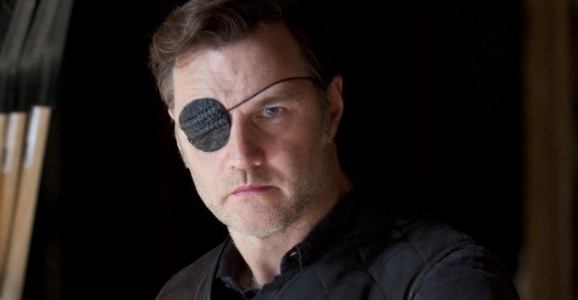David Morrissey Discusses The Governor’s Return
Just a warning, if you haven’t watched the most recent episode of AMC’s The Walking Dead, “Internment,” you might want to skip this post because it contains SPOILERS.
 We all knew this was coming, and that it would likely happen soon. The week leading up to “Internment” was full of producer type folks talking about a conspicuous absence on season four of The Walking Dead. With this elevated level of chatter, many suspected this was the week, but that final shot, pulling away, exposing the Governor (David Morrissey), is a hell of a way to end an episode. Fans have been waiting to catch a glimpse of former despot of Woodbury—so has Michonne (Danai Gurira)—and while we don’t know exactly where the story is going, rest assured that his return does not spell happy fun times for the survivors.
We all knew this was coming, and that it would likely happen soon. The week leading up to “Internment” was full of producer type folks talking about a conspicuous absence on season four of The Walking Dead. With this elevated level of chatter, many suspected this was the week, but that final shot, pulling away, exposing the Governor (David Morrissey), is a hell of a way to end an episode. Fans have been waiting to catch a glimpse of former despot of Woodbury—so has Michonne (Danai Gurira)—and while we don’t know exactly where the story is going, rest assured that his return does not spell happy fun times for the survivors.
A lot has happened since we last saw the Governor, as he mowing down his own people with automatic weapons fire and laying siege to the prison. What has all of this space meant for him, and what does his reemergence mean for Rick (Andrew Lincoln) and his fellow survivors? Morrissey recently sat down with Entertainment Weekly to address these, and other issues his return brings up, as well as how his character is feeling emotionally.
He’s still the man that we know. It’s not like we can erase his past or change the character totally. He is a man who is aware of himself now. I think the Governor at the beginning of season 3 was a man who was building a future. He had a future for Woodbury. He had a plan for Woodbury. And those plans get smashed. And certainly the future for his daughter and any sort of cure experiment that he and Milton were exploring — that’s out the window now.
Taking away a man’s future, his hope, is a sure fire way to push him to the brink. At this point he’s lost everything, his home, his family—both literal and figurative—and that makes dealing with him, however that shakes out, a tricky proposition. Morrissey continues:
He’s a dangerous man still and he knows how dangerous he is. He knows what he’s capable of and that is a very dangerous thing. And like I said, it’s about whether he embraces that man and how dangerous he is, or whether he fights him. That’s the question coming in — which character is he happy to be? Which character is he trying to be? We see him at the end of episode 5 and he’s standing outside that prison and looking at that prison and we don’t know whether he’s come in peace or come in war. We don’t know that yet. So we have to wait for that reveal in the upcoming episodes. He might have had an about face, but we don’t know. He’s a man who recognizes his own capabilities. That is fair to say.
Are there any of who really believe that the Governor comes in peace? That ship has sailed. You get that Morrissey has to say this, but it sounds like the BS it is. And if Rick, or any of the other survivors actually buy that line, I feel like half the viewership will jump ship.
We’ve seen the Governor do terrible things, but those of us who have read Robert Kirkman’s comics tend to wonder, how much further can he go? In the source material, the character is so much worse, and we can’t help but wonder exactly what’s in store. Morrissey talks about what he his character’s capacity for violence:
I think he’s intelligent enough to know that there is something that can take over himself. I don’t think he’s totally happy with the capabilities that he’s shown. It was never in his plan to turn on his own people. And the loss of his daughter has done something terrible to his brain. That’s the fight he will have going forward. I think once anybody has committed an act like that or done something like that, they know their capabilities, and it’s about whether they can keep control of themselves. Because they really know now — it’s that cliché of ‘you wouldn’t like me when I’m angry’ — there’s a sense from him that he knows where his anger can take him. And that’s his battle. And will certainly be his battle in season 4.
To be honest, I didn’t particularly care for the Governor last season. Most of that is because I’m so familiar with the character, both from Kirkman’s comics and the novel The Rise of the Governor, and the TV version never felt like anything more than a watered down facsimile, like a different character with the same name. Granted, much of his brutality couldn’t be accurately portrayed on television—the man gets real nasty, especially with Michonne. Even with my misgivings about the character thus far, I’m still cautiously excited for his return.
Up to this point, season four of The Walking Dead has been a huge improvement over all the previous seasons. Consistency, an issue that has dogged the program from day one, hasn’t been as big an issue, and the first six episodes have been uniformly solid. When the characters live with horror like walking corpses on a daily basis, it becomes less and less easy to use them to frighten, the characters or the audience. This season, the show has moved away from trying to use the zombies to terrify—which rarely worked—but now they’re employed as looming, peripheral threats, which is much more effective, and allows more time to develop the characters.
The point that I’m trying to get to is that season four has addressed, or is in the process of addressing, many of the lingering problems The Walking Dead has faced. Right or wrong, most of the credit goes to newly entrenched showrunner Scott Gimple, and regardless of who we should heap praise on, I’m beginning to have something that resembles faith in the creative team, and that extends to the reintroduction of the Governor. We’ll see if this trust comes back to bite me on the ass, but over the course of six episodes, they’ve earned the benefit of the doubt. It won’t take much to ruin that, but for now I’ll wait and see. Hopefully the Governor will start to live up to his potential as a villain over his next visit to the series.











